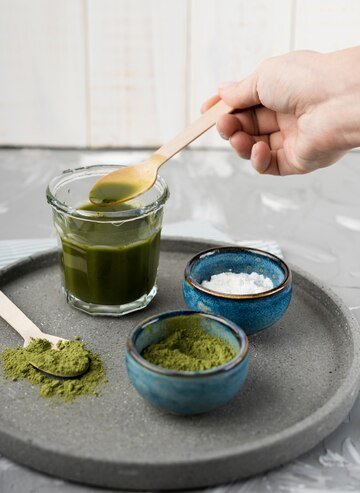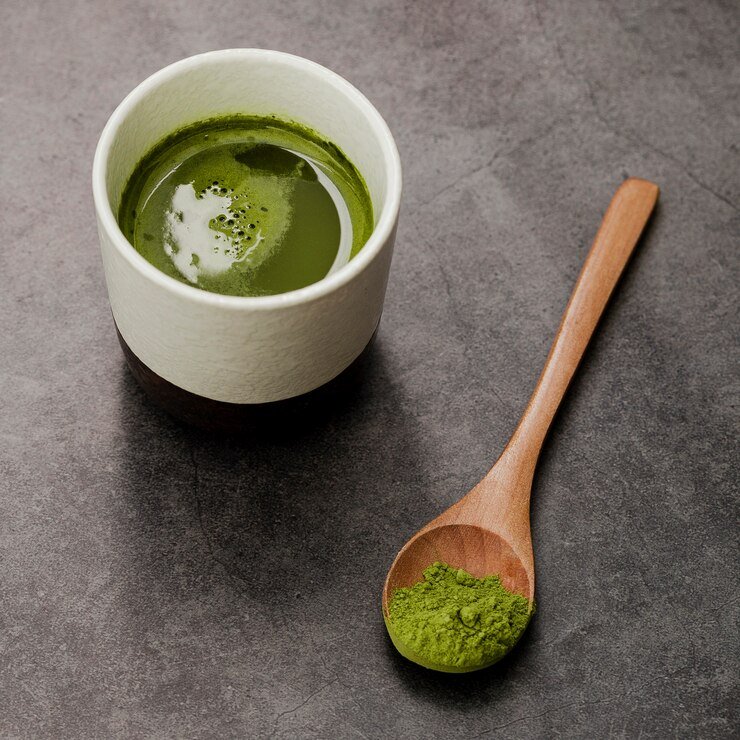Introduction

In recent years, matcha has surged in popularity as a superfood, renowned for its vibrant green color, rich flavor, and numerous health benefits. Whether you’re a matcha enthusiast or just curious about this potent green tea powder, finding the best matcha “near me” can enhance your daily routine. This comprehensive guide will help you discover top-notch matcha options close to you, ensuring that every sip you take is of the highest quality.
What is Matcha?

Matcha is a finely ground powder made from specially grown green tea leaves. Unlike traditional green tea, where leaves are steeped in water and then discarded, matcha involves consuming the entire leaf, leading to a higher concentration of nutrients and antioxidants. This unique preparation process gives matcha its vibrant green color and distinctive flavor.
Why Matcha?
Health Benefits
Matcha is celebrated for its numerous health benefits. Here are some reasons why you should consider incorporating matcha into your diet:
- Rich in Antioxidants: Matcha is packed with antioxidants, particularly catechins, which help combat free radicals and reduce oxidative stress.
- Boosts Metabolism: The EGCG (epigallocatechin gallate) in matcha can enhance metabolic rate and promote fat burning.
- Enhances Focus and Calm: Matcha contains L-theanine, an amino acid that promotes relaxation and mental clarity, balancing the caffeine content for a more sustained energy boost.
- Detoxifies the Body: The chlorophyll in matcha helps detoxify the body by flushing out toxins and heavy metals.
- Supports Heart Health: Regular consumption of matcha may contribute to lower blood pressure and improved cholesterol levels.
Finding Matcha Near Me: A Comprehensive Approach
To find the best matcha “near me,” consider the following steps:
1. Local Tea Shops
Local tea shops often carry high-quality matcha sourced from renowned producers. Look for stores that offer organic or ceremonial grade matcha, which typically ensures superior quality. Many tea shops also provide samples, so you can taste before you buy.
2. Specialty Health Stores
Health food stores and specialty shops focusing on natural products are excellent places to find premium matcha. These stores often stock matcha in various forms, including loose powder, matcha blends, and ready-to-drink matcha beverages.
3. Online Marketplaces
If you’re having trouble finding matcha locally, online marketplaces can be a great resource. Websites like Amazon, Etsy, and specialized matcha retailers offer a wide range of matcha products. Ensure to read reviews and check for certifications to guarantee the authenticity and quality of the matcha.
4. Local Farmers’ Markets
Farmers’ markets can be a hidden gem for finding high-quality matcha. Some vendors specialize in tea and may offer locally sourced or artisanal matcha products. These markets also provide an opportunity to connect with sellers and learn more about their products.
5. Cafés and Restaurants
Many cafés and restaurants, especially those with a focus on healthy or Asian cuisine, offer matcha beverages and desserts. Visiting these establishments can be a delightful way to enjoy matcha and discover where they source their matcha from.
Tips for Choosing the Best Matcha
When selecting matcha, keep the following tips in mind to ensure you’re getting a high-quality product:
- Color: Look for matcha with a vibrant green color. A dull or yellowish hue indicates lower quality.
- Texture: High-quality matcha should be finely ground and smooth. Avoid matcha with a gritty texture.
- Smell: Fresh matcha has a sweet, vegetal aroma. If it smells bitter or stale, it may be old or poorly processed.
- Taste: High-quality matcha should have a rich, umami flavor with a slight sweetness. Bitter or astringent taste can be a sign of lower quality.
- Origin: Matcha from Japan, particularly from regions like Uji and Kyoto, is often considered superior due to traditional cultivation methods and quality control.
How to Prepare Matcha
Proper preparation of matcha is crucial to achieve the best flavor and texture. Here’s a simple guide to making a delicious cup of matcha:
- Ingredients:
- 1 to 2 teaspoons of matcha powder
- 2 ounces of hot water (not boiling, around 175°F or 80°C)
- Optional: sweetener, milk, or a milk alternative
- Instructions:
- Sift the matcha powder into a bowl to remove any clumps.
- Add hot water to the bowl.
- Use a bamboo whisk (chasen) to whisk the matcha in a “W” motion until it becomes frothy and well combined.
- Enjoy as is, or add your choice of sweetener or milk.
Matcha Recipes to Try
Incorporating matcha into various recipes can be a fun and delicious way to enjoy its benefits. Here are a few ideas:
- Matcha Latte: Mix matcha with steamed milk and a touch of honey for a creamy and comforting beverage.
- Matcha Smoothie: Blend matcha with your favorite fruits, yogurt, and a splash of almond milk for a nutritious smoothie.
- Matcha Pancakes: Add matcha powder to your pancake batter for a vibrant and healthful twist on a breakfast classic.
- Matcha Energy Balls: Combine matcha with nuts, seeds, and dates for a quick and energizing snack.
- Matcha Ice Cream: Make a refreshing and creamy matcha ice cream at home using an ice cream maker or a no-churn method.
FAQs
What is the difference between ceremonial grade and culinary grade matcha?
Ceremonial grade matcha is the highest quality and is used in traditional Japanese tea ceremonies. It has a smooth, sweet flavor and vibrant green color. Culinary grade matcha is lower quality and is used in cooking and baking. It has a more robust flavor that can stand up to other ingredients.
How should I store matcha?
Matcha should be stored in an airtight container in a cool, dark place. Exposure to light, heat, and moisture can degrade its quality. For the best flavor and freshness, use matcha within a few months of opening.
Can I drink matcha if I’m sensitive to caffeine?
Matcha does contain caffeine, but the L-theanine in matcha helps to balance the stimulant effects. If you’re sensitive to caffeine, start with a small amount and monitor how your body responds.
How often should I consume matcha?
Moderation is key. Consuming 1 to 2 cups of matcha daily is generally considered safe for most people. However, individual tolerance levels vary, so adjust based on your personal needs and health goals.
Where can I find matcha in bulk?
Many online retailers and specialty health stores offer matcha in bulk. Purchasing in bulk can be cost-effective, especially if you use matcha regularly. Look for reputable suppliers that offer high-quality matcha with clear labeling.
Conclusion
Finding the best matcha “near me” can be a rewarding experience, allowing you to enjoy high-quality, fresh matcha with maximum health benefits. Whether you prefer visiting local tea shops, exploring specialty health stores, or purchasing online, there are numerous options to suit your needs. By following the tips provided in this guide, you can ensure that you’re selecting top-notch matcha that enhances your well-being and satisfies your taste buds.
You can see lates updates on: thefsiblog



